‘My kids roll their eyes at mother tongue books’: How to get them to read such books
Sign up now: Get tips on how to help your child succeed
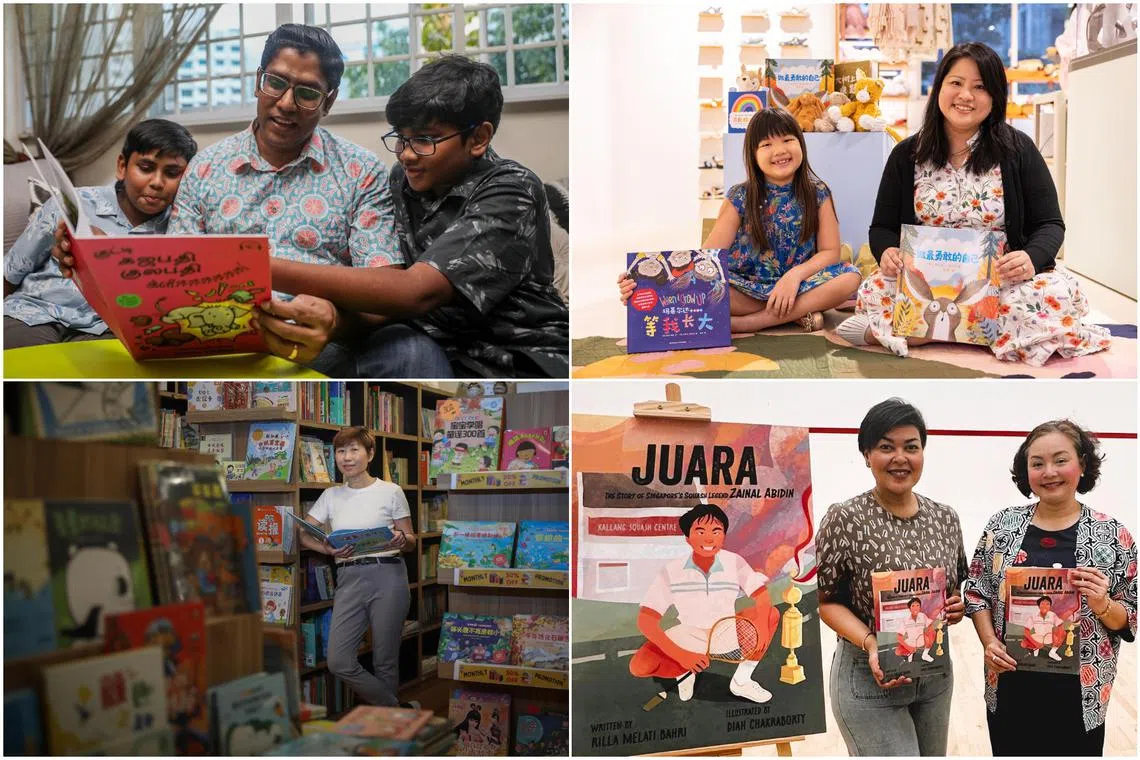
Booksellers, specialising in Chinese, Malay and Tamil titles, offer tips on how parents can help kids spark a love of reading.
PHOTOS: LUTHER LAU, BRIAN TEO, MINI MONSTERS, TARYN NG
SINGAPORE – Getting kids to pick up a book is tough. Encouraging them to read in their mother tongue language? That is an even bigger challenge.
Dr Tan Ee Ling, who runs Chinese online bookstore Shiawase Books, has heard the common refrain among parents. And she is not spared from the problem.
“Do your children roll their eyes when you mention Chinese books? I have two such kids,” she says, referring to her daughters aged 10 and 12. She is unfazed, and also hopeful that they will enjoy reading them someday.
“Whenever kids and adults tell me they don’t read in their mother tongue language, I let them know that it’s okay. They just haven’t found a story that speaks to them.”
Dr Tan and five other booksellers, specialising in Chinese, Malay and Tamil titles, offer tips on how parents can help kids spark a love of reading. They also share the ups and downs of their businesses.
Know your child’s interests: Maha Yu Yi
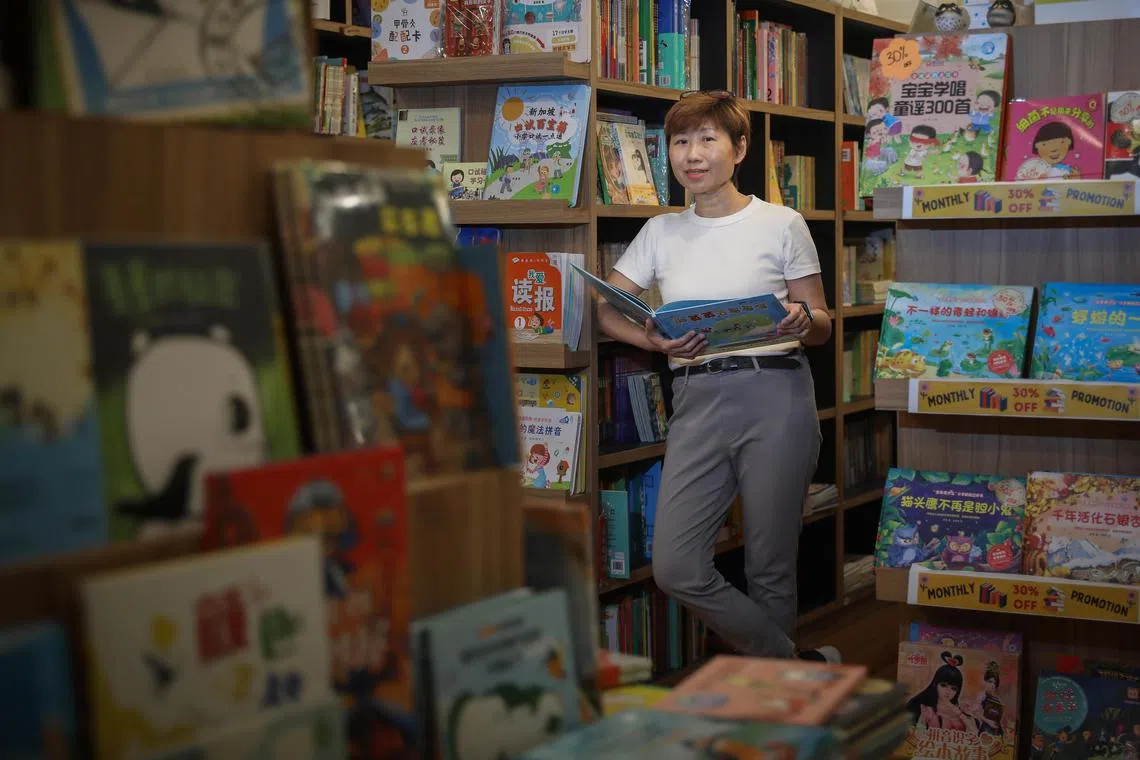
Maha Yu Yi bookstore manager Sung Yuen Ling often recommends books to customers based on their interests.
ST PHOTO: TARYN NG
The “right” book is one that matches your kid’s interests and reading level, says Ms Sung Yuen Ling. Maha Yu Yi, run by her and her brother and sister-in-law, is one of the few Chinese bookstores with both an online ( yuyi.com.sg
With a children’s collection of more than 1,000 books – from heart-warming stories to inspiring biographies to quirky tales – kids are sure to find one that captures their imagination, the 56-year-old says.
These include a book about different types of toilets, an adventure in which a character descends 100 floors into a swamp encountering strange creatures, and a humorous story about eight greedy cats causing mischief.
Some older children may resist reading in Chinese, so Ms Sung suggests starting them with what they are already familiar with.
“If they love Dog Man, Minecraft, Super Wings, Spiderman, Harry Potter, Totoro or Roald Dahl books, parents can introduce them to the Chinese versions,” she says. Graphic novels, comics and books with captivating illustrations are also great ways to get them into reading.
The store teams with authors and educators to host storytelling sessions at least once a month.
Maha Yu Yi was founded by her father Sung Teo Chu in 1969. Ms Sung, who has an engineering degree from Nanyang Technological University, joined the business in 1994.
She started taking an interest in children’s books when her son was born in 2001. At that time, she found that Chinese titles were overly focused on moral values and tended to be preachy. This was unlike English books, which could be filled with fantasy, magic, fun, humour and adventure.
However, the themes of Chinese books have become more diverse over the years. Publishers are translating popular titles from America, Europe and Japan as well, she says.
Her team also recommends and supplies books to the National Library and schools.
Curating books is a meticulous process. “This is why it can be disheartening when some visitors just take pictures of our books without making a purchase,” she laments.
“While we understand that customers have different purchasing habits, we hope they recognise the value of supporting an independent bookstore like ours where expertise, passion and effort go into every book selection.”
Make learning fun and interactive: Tamilwithlove

Mr Sounthirarajan's online store Tamilwithlove offers a variety of fun learning resources to support the learning of Tamil.
ST PHOTO: LUTHER LAU
Exposing kids to mother tongue books and games from a young age is crucial for their language development, says Mr Sounthirarajan, a father of two boys aged nine and 13.
“My wife and I made the mistake of not reading Tamil books with our elder son when he was younger, but resources were also limited then,” says Mr Rajan.
That inspired his wife Deepa Asha Dewi to start Tamilwithlove, a retail store selling mostly Tamil learning resources at Little India Arcade in 2018. In addition to sourcing children’s books, she also designed educational Tamil products, such as Scrabble tiles and flash cards.
Mr Rajan, 43, says using games, activities and other interactive methods can make learning more enjoyable and less intimidating, especially for children who are struggling with the language.
The business moved online ( tamilwithlove.com
He took charge of the business in late 2023 after Madam Deepa, 41, decided to pursue a career as a special educational needs officer.
Besides online purchases by parents, he gets regular orders from schools, which helps keep his business stable. But it is still unsustainable if he does not keep his day job as a financial planner.
“The idea of closing down the business has crossed my mind occasionally, especially over the past two years. Yet I can’t help but think about my customers and their children. What resources will be available to them? How will we respond to the teachers who regularly reach out to us for teaching materials?” he says.
“I will continue running the business and providing as much value as possible.”
His online store now offers a variety of fun products, including Tamil editions of popular board games like Monopoly and Game of Life.
He says: “With the mother tongue resources available these days, there’s no reason not to expose your children to them.”
Introduce different books to your kids: Shiawase Books
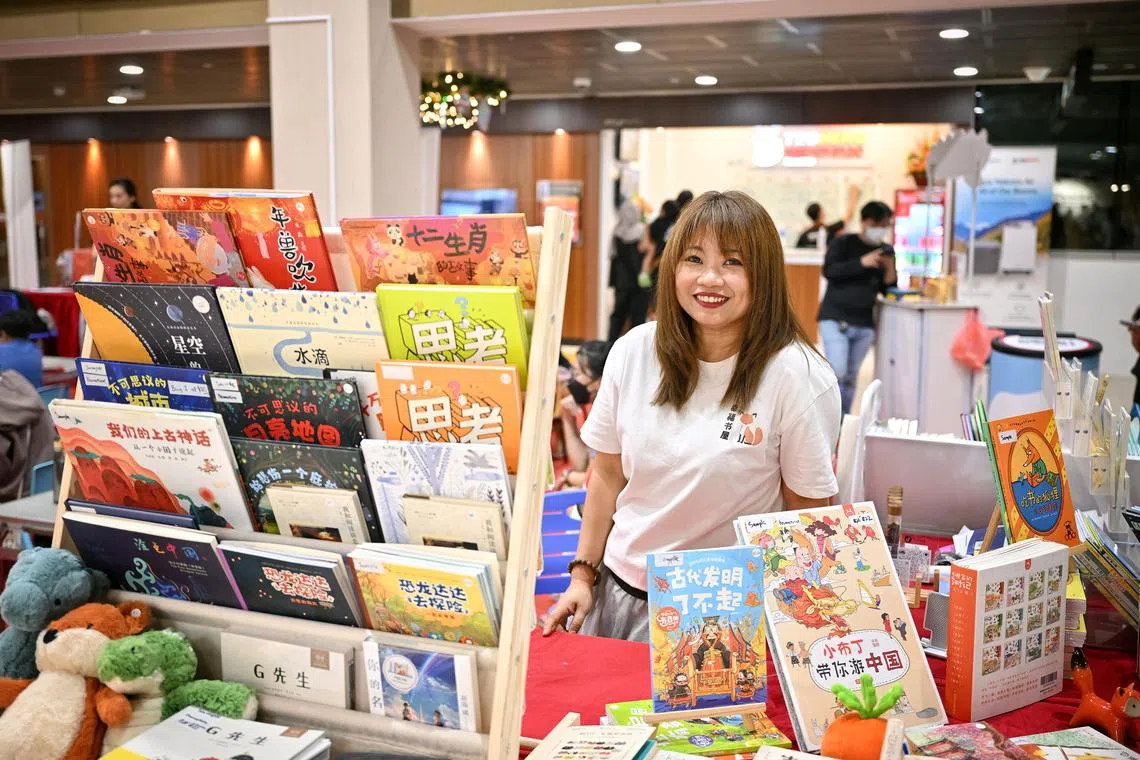
Dr Tan Ee Ling, founder of Shiawase Books, hopes children in Singapore do not lose their bilingual skills when they grow up.
ST PHOTO: ARIFFIN JAMAR
Find a book they like and they will want to read more. Dr Tan Ee Ling firmly believes in that.
When her daughters, now aged 10 and 12, were younger, she persisted in introducing them to different books until they found ones they liked. “I don’t judge what they read and give them free rein,” says Dr Tan, 46, who holds a PhD in communication.
She had more success encouraging them to love English books than Chinese ones, but she did not give up.
She searched beyond local offerings for Chinese fiction books that would appeal to upper primary and secondary school children, like her daughters. Eventually, she conceived Shiawase Books in 2021, an online venture dedicated to Chinese leisure reads.
Her customers are mostly parents purchasing books for their children. She also collaborates with tuition centres which provide her with space at their events to display her books.
She hopes children in Singapore do not lose their bilingual skills when they grow up. Dr Tan, who lived in the United States for 15 years, is equally at ease reading novels by American author Ernest Hemingway and Chinese writer Mo Yan.
“It is possible to be good at both English and Chinese. I wish more Singaporeans can feel that way. We all spent at least 10 years learning our mother tongue throughout our education.”
She adds: “I hope kids can find an interesting story in their mother tongue and change the way they perceive the language and culture.”
Go to book festivals, join storytelling sessions: Pustaka Nasional
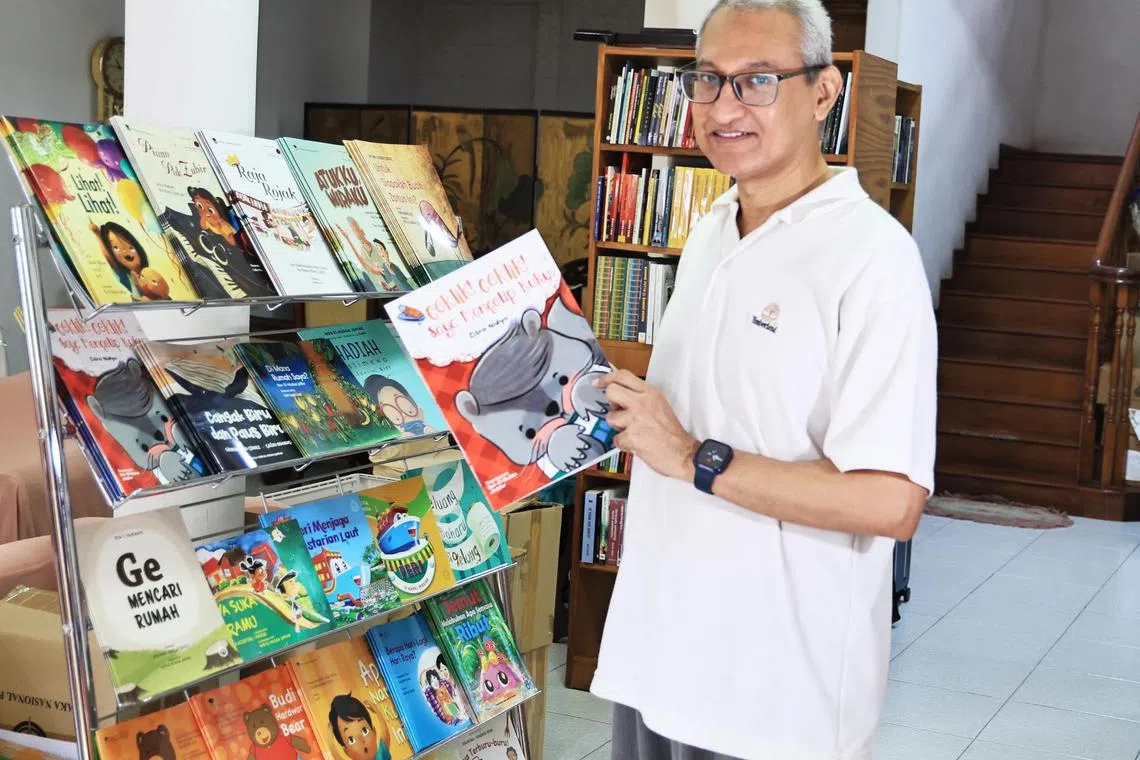
Mr Syed Ali Semait, director of Pustaka Nasional, observes that more parents are supporting home-grown Malay books.
ST PHOTO: KELVIN CHNG
Take your kids to book festivals and libraries, and participate in storytelling sessions or other literary activities.
These experiences go a long way in helping your kids foster a love of reading in their mother tongue, says Mr Syed Ali Semait, a director at Pustaka Nasional. The company, founded by his late father Syed Ahmad Muhammad Semait, has been publishing Malay literary and religious books since 1963.
Mr Syed Ali also suggests that parents engage their children in discussions about the books they are reading and ask open-ended questions to encourage critical thinking. They can then follow up with related activities, such as drawing pictures and making crafts, to reinforce learning and make reading more interactive.
Since 2013, his company has collaborated regularly with Singaporean authors to publish children’s books using grants from the National Arts Council and Lee Kuan Yew Fund for Bilingualism. It has worked with the National Institute of Education’s trainee teachers to create the GPS Children’s Book Series.
Mr Syed Ali also visits regional book fairs to buy rights to translate picture books into Malay. He looks out for stories that impart positive values, depict local cultures or activities, and spark children’s imagination.
He observes that in recent years, there has been a growing interest among parents in getting Malay books that have a local flavour. The children’s book scene also has better quality and variety compared with 15 years ago, with more writers and publishers entering the market.
Beyond reading with children, he highlights the importance of chatting regularly with them in their mother tongue at home.
“The consistent exposure helps build their confidence and expand their vocabulary. Take the time to explain the meaning of unfamiliar words,” he adds.
Parents should read regularly too: Flip For Joy
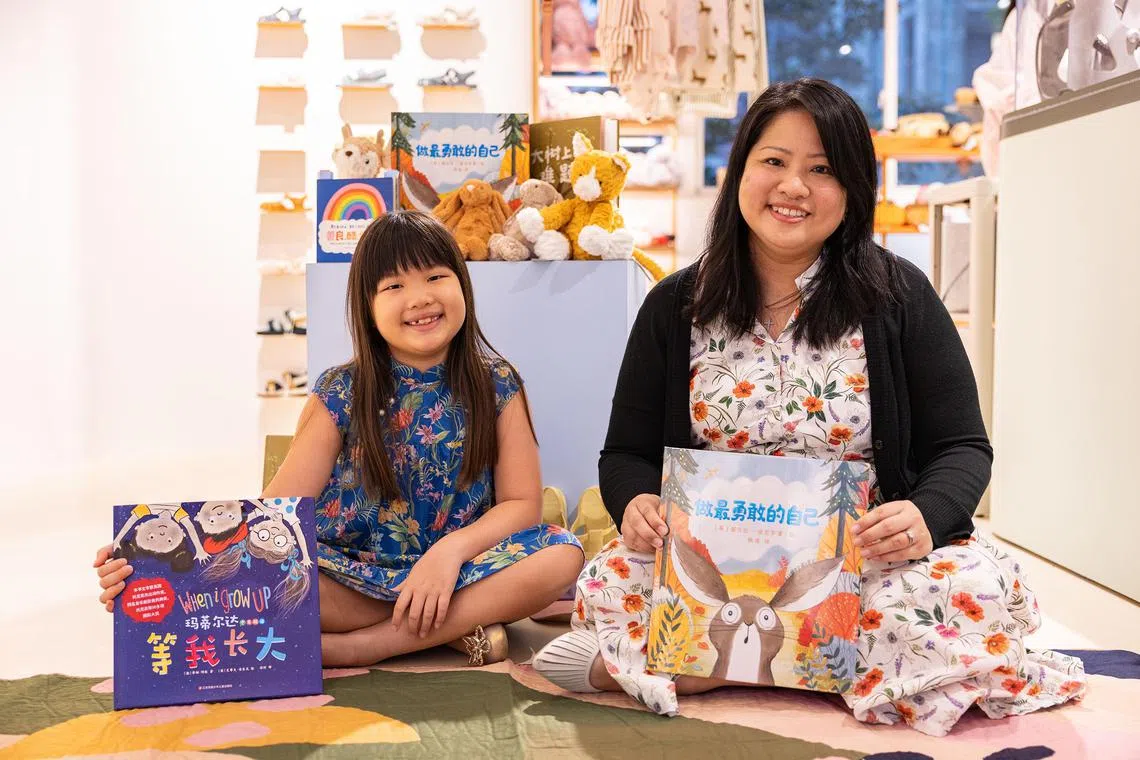
Flip For Joy founder Jiang Meiru, seen here with her daughter Gracelyn Ho, partners children’s fashion and lifestyle stores such as Sea Apple to retail books.
ST PHOTO: BRIAN TEO
Your kids are more likely to pick up a book if you read regularly. So, be sure to lead by example, says Madam Jiang Meiru.
The former Chinese-language junior college teacher founded Chinese online bookstore Flip For Joy in 2011 when her son was two years old.
Passionate about reading and raising bilingual children, she was constantly looking for interesting Chinese children’s books. This led her to start buying books from overseas.
Over time, her friends also began requesting her to purchase books for them too. With their encouragement, Flip For Joy was born.
Madam Jiang, 42, partners children’s fashion and lifestyle stores Sea Apple, Le Petit Society and Liliewoods Social to retail the books, in addition to selling them online ( flipforjoy.com.sg
She collaborates with pre-schools to build their Chinese library collection and conducts workshops for parents on raising bilingual children. Most recently, she developed a Chinese curriculum for a secondary school as a language consultant.
She advises parents to set aside time to read with their kids, despite their busy schedules. “It’s definitely worth it,” she says. Her son is now 16 and she also has an eight-year-old daughter.
Not only is it a great way to bond with them, but your children will also develop positive associations with reading, which will encourage them to become avid readers.
Equally important is creating an environment that encourages reading, she says. Books should be easily accessible and displayed attractively. Consider using front-facing bookshelves to showcase book covers and capture your children’s attention.
Give them Singapore children’s books: Mini Monsters
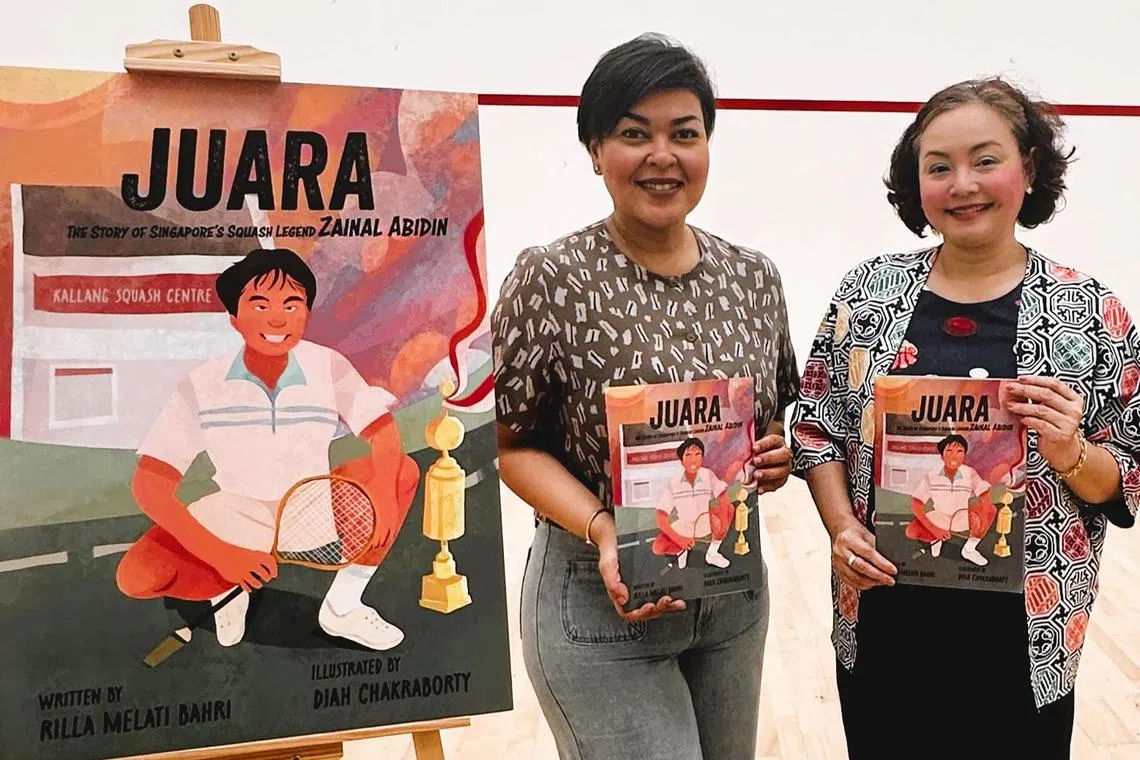
Mini Monsters co-founder Rilla Melati Bahri (right), seen here with director Lydia Cheriyan, is the author of biographical picture book Juara, about squash veteran Zainal Abidin.
PHOTO: MINI MONSTERS
Books by home-grown authors and illustrators, often featuring familiar scenes, places and characters, can inspire a love of reading in your children’s mother tongue.
For instance, illustrations of HDB blocks will allow your kids to identify with the story and find it relatable. Stories set in iconic attractions, such as Gardens by the Bay, may spark their interest to read and motivate them to visit the places, says Ms Lydia Cheriyan.
The 38-year-old is a business development director at Mini Monsters, a publisher of English-Malay children’s books and enrichment course provider.
Co-founded in 2009 by former actress-host Rilla Melati Bahri and entertainment veteran Najip Ali, the company started off as the education outreach arm of TV production house Dua M.
Ms Lydia also recommends books that have a local hero or local significance. Mini Monsters’ latest offering is Juara, a biographical picture book that tells the story of how, with a discarded racket picked up from a dustbin, Singaporean Zainal Abidin overcame the odds to become a world-class squash player.
In 1989, he defeated defending champion Ross Norman of New Zealand in the final of the Penang Open, leading Singapore to victory.
The book, written by Rilla in English with some simple Malay words, is a good way to attract young readers who may be reluctant to read in Malay. It will be launched at the Asian Festival of Children’s Content 2025, which takes place from May 22 to 25.
And as with some Mini Monsters’ books, children can read the story and go to its website ( minimonsters.com.sg
Ms Lydia says: “Mini Monsters’ job is to fill a gap and change the face of how Malay language is taught and perceived. People always see Malay as a language with lesser importance. Children are becoming distant from their mother tongue. Many do not speak the language at home and some who do, do not really understand the nuances and the beauty of it.”
She adds: “Parents are always fretting about how to get good educational materials in Malay that are made in Singapore. Our team wants to reduce the over-dependency on Malay books and resources from across the Causeway, which are not always relevant to what the children in Singapore need.”



